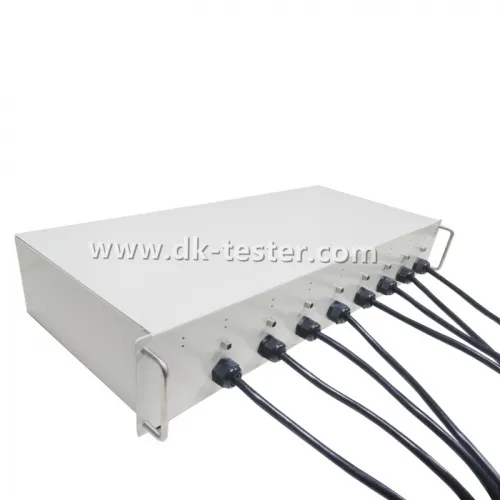By dk-tester | 20 January 2025 | 0 Comments
Why Battery Cyclers Are Essential for Efficient Battery Testing in 2025
Battery technology is advancing rapidly, driven by the growing demand for efficient energy storage solutions in electric vehicles, renewable energy systems, and personal electronics. With these advancements comes the increasing need for precise battery testing methods to ensure safety, reliability, and long-term performance. Car battery tester and battery cyclers have emerged as indispensable tools in the modern testing process, offering unparalleled accuracy and efficiency for evaluating battery performance. Whether you're a professional engineer or a business utilizing battery technology, understanding the importance of battery cyclers and their role in efficient battery testing has never been more critical.
Table of contents:
Understanding the Role of Battery Cyclers in the Modern Testing Process
How Battery Cyclers Improve Accuracy for Battery Capacity Evaluation
The Advantages of Using Battery Cyclers for Long-Term Performance Monitoring

Recognizing the importance of battery cyclers in today’s fast-paced technological landscape is essential for professionals and industries relying on battery technology. From precise capacity evaluations to long-term degradation analysis, these devices offer a unique combination of accuracy, safety, and efficiency. Integrating advanced tools, such as the DSF3020 by leading battery cycler manufacturers, can streamline operations, enhance performance, and deliver actionable insights into battery functionality. Whether you’re a business investing in new energy systems or a researcher pushing the boundaries of battery innovation, battery cyclers are a critical piece of the puzzle. Incorporating these tools into your workflow ensures not only compliance with industry standards but also a significant competitive edge in developing and maintaining high-performance batteries.
Table of contents:
Understanding the Role of Battery Cyclers in the Modern Testing Process
How Battery Cyclers Improve Accuracy for Battery Capacity Evaluation
The Advantages of Using Battery Cyclers for Long-Term Performance Monitoring
Understanding the Role of Battery Cyclers in the Modern Testing Process
Battery cyclers play a vital role in the modern testing process by providing precise control and measurement capabilities. Manufacturers and researchers depend on these devices to perform highly accurate charge and discharge cycles, simulating real-world usage conditions. Advanced battery cyclers, such as the DSF3020 model highlighted by battery cycler manufacturers like DK-Tester, support multiple battery chemistries—including lead-acid, lithium-ion, and nickel-based batteries—making them versatile tools across industries. These devices allow users to set and monitor parameters like voltage, current, and temperature, ensuring data consistency and reliability. Furthermore, they incorporate features like automatic shutdown during abnormal conditions, protecting batteries and operators from potential hazards. Tools like the DSF3020 also integrate modern software solutions to record test data and generate detailed reports, enabling users to analyze battery performance with unparalleled clarity. For businesses using car battery testers or battery modules for electric vehicles, battery cyclers streamline workflows, reducing manual effort and human error.
How Battery Cyclers Improve Accuracy for Battery Capacity Evaluation
One of the standout advantages of battery cyclers is their efficiency in evaluating battery capacity and lifespan. Specific models, such as those developed by DK-Tester, are designed to analyze batteries under controlled conditions accurately. For instance, the DSF3020 allows users to automate charge and discharge cycles and provides detailed insights into key performance indicators like capacity retention, internal resistance, and discharge rates. These insights are invaluable for understanding how a battery will perform over time, particularly under demanding operating conditions. By enhancing accuracy and automating standard processes, battery cyclers minimize inconsistencies, ensuring that results are reliable for decision-making. This is particularly critical for companies optimizing battery packs in electric vehicles, where durability and efficiency can significantly impact product success. Additionally, the advanced computational capabilities of battery cyclers enable faster data analysis, allowing manufacturers and engineers to iterate their designs more rapidly.The Advantages of Using Battery Cyclers for Long-Term Performance Monitoring
Battery cyclers also excel in monitoring long-term battery performance, providing detailed insights into degradation and capacity loss over time. One key feature offered by manufacturers such as DK-Tester is the ability to conduct repeated cycles—at times numbering in the thousands—while tracking parameters like voltage decay, current fluctuations, and temperature variations. Long-term monitoring is especially crucial for high-drain applications like electric vehicles, where battery performance directly impacts range and overall usability. For instance, DK-Tester’s DSF3020 model provides an innovative temperature monitoring function, automatically halting operations if set thresholds are exceeded, safeguarding both the battery and surrounding equipment. Additionally, battery cyclers facilitate the matching of individual cells within a larger battery pack, ensuring uniform performance. Comprehensive data recording features, like those offered by the DSF3020, allow users to compare and analyze multiple test results with ease, identifying trends and potential failure points before they become critical issues. These capabilities not only improve the safety and reliability of battery-powered systems but also extend battery life, contributing to cost savings and heightened sustainability.Recognizing the importance of battery cyclers in today’s fast-paced technological landscape is essential for professionals and industries relying on battery technology. From precise capacity evaluations to long-term degradation analysis, these devices offer a unique combination of accuracy, safety, and efficiency. Integrating advanced tools, such as the DSF3020 by leading battery cycler manufacturers, can streamline operations, enhance performance, and deliver actionable insights into battery functionality. Whether you’re a business investing in new energy systems or a researcher pushing the boundaries of battery innovation, battery cyclers are a critical piece of the puzzle. Incorporating these tools into your workflow ensures not only compliance with industry standards but also a significant competitive edge in developing and maintaining high-performance batteries.
Leave a Reply
Your email address will not be published.Required fields are marked. *
POPULAR BLOG
- Boosting Energy Efficiency in Battery Testing: Strategies for Sustainable Operations
- Top 5 Car Battery Testers of 2024: Unleash Peak Performance
- Advanced Battery Testing: Key to Efficient EV Manufacturing and Market Success
- Empowering Industries: Applications of Li-ion Battery Testing Equipment
- Maximize Your Electric Car's Performance with Our Battery Tester
CATEGORIES
TAGS